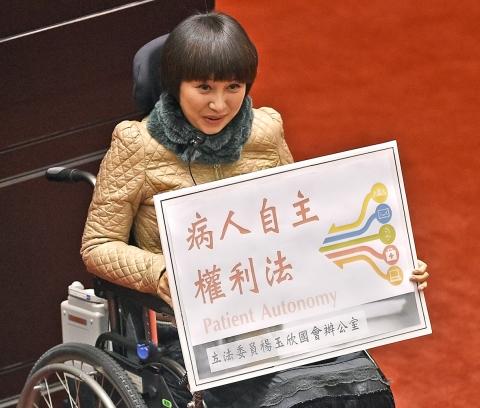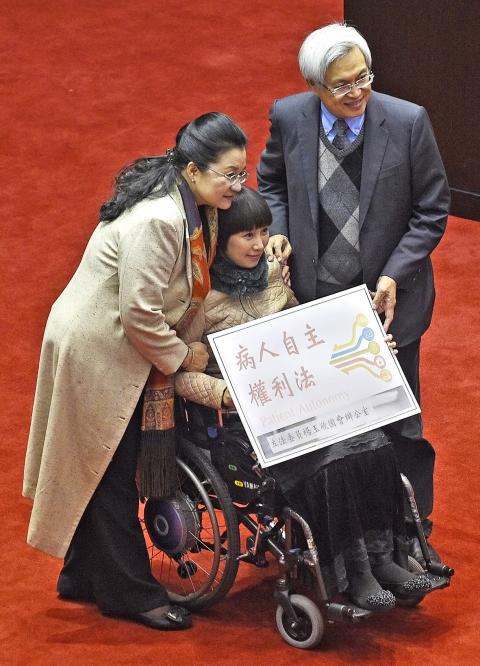The Patient Autonomy Act (病人自主權利法), which gives adult patients the right to create advance healthcare directives (AHD) regarding their preferences for medical care in the event they are rendered incapable of making such decisions, was passed by the Legislative Yuan late on Friday night.
The main focus of the legislation is to allow people with full capacity for civil conduct to create an AHD — a legal document stipulating their decisions regarding treatment they would want or not want to receive if unable to communicate their wishes — through advance healthcare consultation with physicians.
The Ministry of Health and Welfare said it was the first patient self-determination legislation passed among Asian nations, which should be a significant improvement for patients’ rights, and is to come into effect three years from now.

Photo: Chen Chih-chu, Taipei Times
In the meantime, the ministry plans to launch a pilot program and gather medical professionals to discuss the details of the act.
The legislation stipulates that before a decision can be reflected on a person’s National Health Insurance card — officially validating their AHD — the person must accept advance healthcare consultation services provided by healthcare facilities and obtain the notarized signatures of two witnesses with full capacity for civil conduct and the medical professionals on the consultation team recorded in the AHD.
Five incapacitating medical conditions can trigger the use of an AHD: a terminal disease prognosis; an irreversible coma; a permanent vegetative state; severe dementia; and government-stipulated medical conditions that result in unbearable pain or are incurable diseases with no alternative treatment.

Photo: Chen Chih-chu, Taipei Times
At least two physicians specializing in the exhibited condition and a palliative care team must confirm the condition before the AHD goes into effect.
To protect healthcare professionals that might be worried about the law, the ministry said the act stipulates that healthcare facilities or physicians can choose not to enforce the AHD based on their professional opinion, and those who terminate treatment or life-sustaining measures in accordance with an AHD would not bear criminal or civil liabilities.
In addition, the law stipulates that a patient’s family members cannot interfere with treatment provided in accordance with an AHD, the ministry said.
Chinese Nationalist Party (KMT) Legislator Yang Yu-hsin (楊玉欣), who proposed the legislation, said the act protects patients’ right to know, choose and refuse medical treatment, but does not validate euthanasia, because medical professionals are still prohibited from providing substances that would kill a patient.
While patients often need family members to consent to medical treatment in their stead, the act allows unmarried people, same-sex couples and people without families to commission an individual they trust to provide guidance on their wishes in extreme situations.
However, the opinions of healthcare professionals regarding the act are polarized, said Taiwan Medical Association director-general and KMT Legislator Su Ching-chuan (蘇清泉), who urged the ministry to discuss the details of AHD enforcement rules with specialists before the act goes into effect.

Taiwanese Olympic badminton men’s doubles gold medalist Wang Chi-lin (王齊麟) and his new partner, Chiu Hsiang-chieh (邱相榤), clinched the men’s doubles title at the Yonex Taipei Open yesterday, becoming the second Taiwanese team to win a title in the tournament. Ranked 19th in the world, the Taiwanese duo defeated Kang Min-hyuk and Ki Dong-ju of South Korea 21-18, 21-15 in a pulsating 43-minute final to clinch their first doubles title after teaming up last year. Wang, the men’s doubles gold medalist at the 2020 and 2024 Olympics, partnered with Chiu in August last year after the retirement of his teammate Lee Yang

FALSE DOCUMENTS? Actor William Liao said he was ‘voluntarily cooperating’ with police after a suspect was accused of helping to produce false medical certificates Police yesterday questioned at least six entertainers amid allegations of evasion of compulsory military service, with Lee Chuan (李銓), a member of boy band Choc7 (超克7), and actor Daniel Chen (陳大天) among those summoned. The New Taipei City District Prosecutors’ Office in January launched an investigation into a group that was allegedly helping men dodge compulsory military service using falsified medical documents. Actor Darren Wang (王大陸) has been accused of being one of the group’s clients. As the investigation expanded, investigators at New Taipei City’s Yonghe Precinct said that other entertainers commissioned the group to obtain false documents. The main suspect, a man surnamed

The government is considering polices to increase rental subsidies for people living in social housing who get married and have children, Premier Cho Jung-tai (卓榮泰) said yesterday. During an interview with the Plain Law Movement (法律白話文) podcast, Cho said that housing prices cannot be brought down overnight without affecting banks and mortgages. Therefore, the government is focusing on providing more aid for young people by taking 3 to 5 percent of urban renewal projects and zone expropriations and using that land for social housing, he said. Single people living in social housing who get married and become parents could obtain 50 percent more

DEMOGRAPHICS: Robotics is the most promising answer to looming labor woes, the long-term care system and national contingency response, an official said Taiwan is to launch a five-year plan to boost the robotics industry in a bid to address labor shortages stemming from a declining and aging population, the Executive Yuan said yesterday. The government approved the initiative, dubbed the Smart Robotics Industry Promotion Plan, via executive order, senior officials told a post-Cabinet meeting news conference in Taipei. Taiwan’s population decline would strain the economy and the nation’s ability to care for vulnerable and elderly people, said Peter Hong (洪樂文), who heads the National Science and Technology Council’s (NSTC) Department of Engineering and Technologies. Projections show that the proportion of Taiwanese 65 or older would